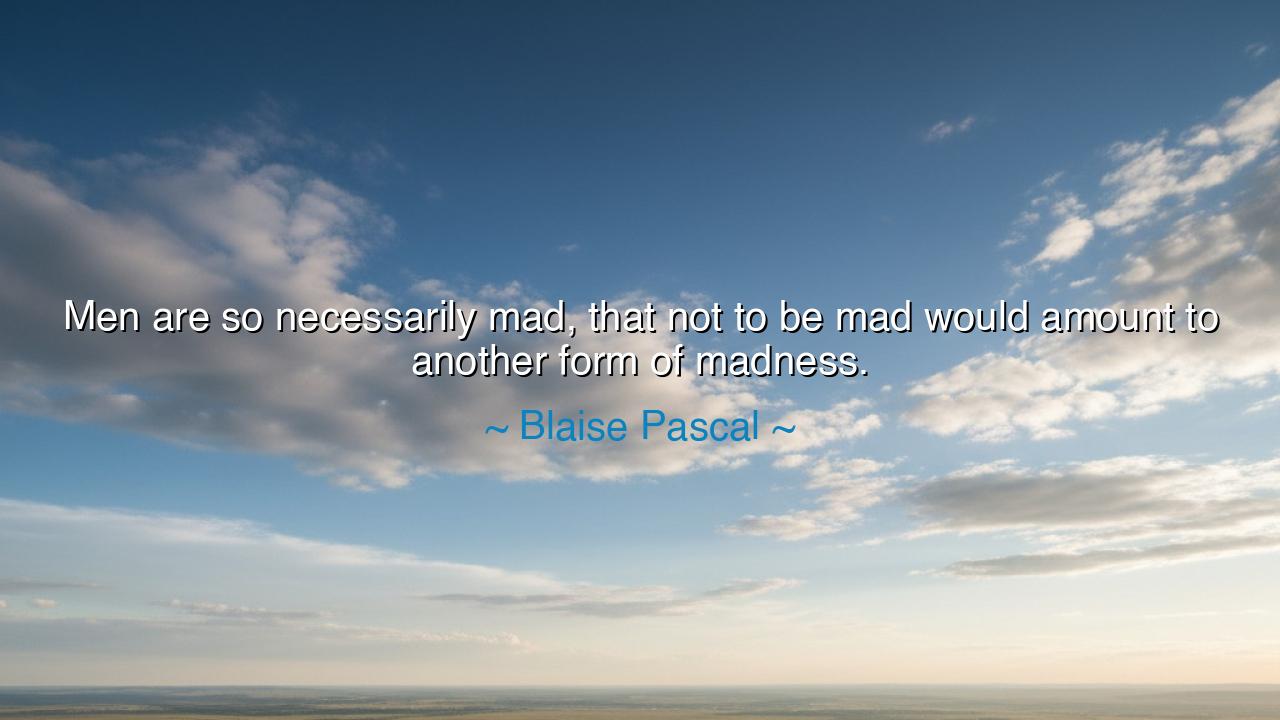
Men are so necessarily mad, that not to be mad would amount to
Men are so necessarily mad, that not to be mad would amount to another form of madness.






Hear the piercing words of Blaise Pascal, the philosopher, mathematician, and seeker of divine truth: “Men are so necessarily mad, that not to be mad would amount to another form of madness.” This utterance strikes the soul like a riddle, yet within it lies profound wisdom. For Pascal saw that the human condition is not one of perfect reason, but of contradiction, restlessness, and folly. To live as a human is to be touched by a kind of madness—a madness of desire, of passion, of longing. And yet, he declares, to attempt to live without this madness, to strip away passion and folly, is itself a deeper madness, for it denies the very essence of what it means to be alive.
The origin of this saying rests in Pascal’s Pensées, his meditations on the nature of man, reason, and faith. Living in the 17th century, an age of both scientific discovery and spiritual conflict, Pascal wrestled with the paradoxes of existence. He knew the power of mathematics, yet he also knew the limits of cold reason. To him, human beings were caught between greatness and wretchedness, between the image of God and the dust of mortality. Out of this tension, he saw that madness was inevitable. Our choices, our loves, our faiths—these are all leaps into the unknown. To live without such leaps, without risk, without passion, is not sanity but another form of insanity.
Consider, O listener, the life of Christopher Columbus. To his critics, his voyage across the unknown ocean was sheer madness—to sail into what many believed was certain death, chasing the dream of a new world. Yet had he not dared this “madness,” the course of history would have been forever altered. His story reveals Pascal’s truth: it is sometimes the madness of vision that moves the world forward. And yet, imagine a man who never dares, who clings only to what is safe, who fears every bold step—that too is a kind of madness, a withering of the soul through inaction.
This teaching also speaks to the realm of faith. Pascal himself declared that to believe in God may appear madness to reason. And yet, he argued, to refuse belief altogether, to deny even the possibility of meaning, is also madness—for it condemns one to despair. Thus, the human being cannot escape; he must choose one madness or another. In this way, Pascal humbles us, showing that certainty is an illusion, and that to live is to risk folly, whether by belief, by doubt, or by pursuit.
The emotional force of this quote lies in its acceptance of contradiction. Too often men and women seek a flawless rationality, a perfect order to life, free of error or passion. But Pascal whispers to us: such a path does not exist. To live is to err, to hope, to burn, to sometimes act with folly. But this folly is also the spark of greatness. The hero’s charge into battle may be madness; the poet’s devotion to beauty may be madness; the lover’s vow may be madness. Yet without these, the world is cold and dead.
The lesson for us is clear: do not fear your share of madness. Embrace it wisely. Let it drive you to boldness, to creativity, to love, to faith. But guard against the madness that destroys—the madness of pride, cruelty, or despair. Pascal does not excuse all forms of folly; he reminds us instead that folly is woven into the fabric of life, and that true wisdom lies in choosing the madness that ennobles rather than the madness that degrades.
So let this be the path: when you face the unknown, do not cling only to the illusion of safety, for that too is madness. Dare to act, to hope, to believe, even when the world calls it folly. For in the end, every man is mad—but the question is: will your madness be one that builds, or one that destroys? Thus speaks Pascal across the ages, a reminder that sanity is not the absence of folly, but the art of choosing wisely among the inevitable forms of madness.






AAdministratorAdministrator
Welcome, honored guests. Please leave a comment, we will respond soon